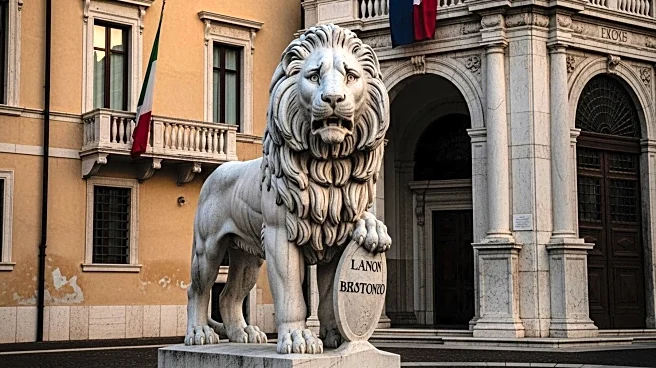What's Happening?
Italian authorities are preparing for a large-scale anti-Israel demonstration in Udine, coinciding with a World Cup qualifying match between Italy and Israel. The protest is organized by the local 'Pro-Palestinian Committee of Udine' and is scheduled to begin at 4:30 p.m. in Piazza della Repubblica, ending near the Friuli Stadium. Security measures include deploying counterterrorism units, installing metal detectors and barriers, and restricting access around the arena. Only 8,000 tickets have been sold for the 25,000-seat venue, reflecting concerns over potential unrest. The demonstration proceeds despite a cease-fire between Israel and Hamas, highlighting ongoing anti-Israel sentiment in Europe.
Why It's Important?
The protest in Udine underscores the persistent tensions surrounding Israel's international relations, particularly in Europe. The deployment of anti-terror units and heightened security measures reflect the seriousness with which Italian authorities are treating the potential for violence. This event could impact diplomatic relations between Italy and Israel, as well as influence public opinion on the Israeli-Palestinian conflict. The situation also highlights the challenges faced by European countries in balancing security concerns with the right to protest, especially in the context of international sports events.
What's Next?
Authorities are closely monitoring the situation, with potential violent infiltrations by activists from neighboring regions being a key concern. The security measures in place, including restrictions on the sale of certain containers, aim to prevent unrest during the protest. The outcome of the demonstration and the match could influence future security protocols for international events in Italy. Additionally, the response from political leaders and civil society groups may shape the narrative around the Israeli-Palestinian conflict in Europe.
Beyond the Headlines
The protest in Udine may have broader implications for cultural and political dynamics in Europe. It highlights the role of sports as a platform for political expression and the complexities of hosting international events amid geopolitical tensions. The situation also raises ethical questions about the balance between security and freedom of speech, as well as the impact of international conflicts on local communities.











